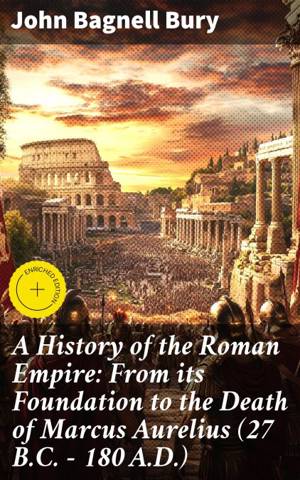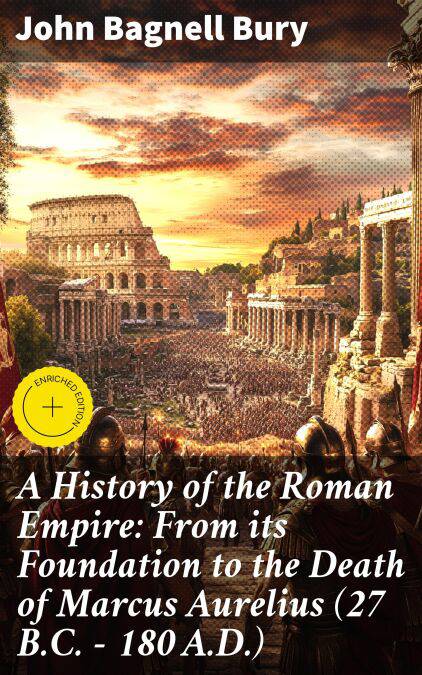
- Afhalen na 1 uur in een winkel met voorraad
- Gratis thuislevering in België vanaf € 30
- Ruim aanbod met 7 miljoen producten
- Afhalen na 1 uur in een winkel met voorraad
- Gratis thuislevering in België vanaf € 30
- Ruim aanbod met 7 miljoen producten
Zoeken
A History of the Roman Empire: From its Foundation to the Death of Marcus Aurelius (27 B.C. – 180 A.D.) E-BOOK
Enriched edition. Exploring Rome's Rise and Fall with Expert Analysis
John Bagnell Bury
E-book | Engels
€ 1,99
+ 1 punten
Omschrijving
In "A History of the Roman Empire: From its Foundation to the Death of Marcus Aurelius (27 B.C. 'Äì 180 A.D.)," John Bagnell Bury masterfully chronicles the expansive history of the Roman Empire, blending meticulous research with a captivating narrative style that brings the political, military, and cultural complexities of the era to life. Bury's work is characterized by its analytical rigor and synthetic overview, making it a pivotal contribution to Roman historical scholarship. He delves into the intricacies of imperial governance, social structures, and the socio-political dynamics that influenced the rise and fall of emperors, particularly focusing on how these elements shaped the empire up to the death of one of its most significant emperors, Marcus Aurelius. John Bagnell Bury (1861-1927) was a notable historian and classical scholar whose extensive academic background and expertise in Latin and Greek literature propelled him to examine the intricacies of the Roman Empire with a discerning eye. Educated at Trinity College, Dublin, Bury not only authored this seminal work but also engaged deeply with classical texts, enabling him to contextualize Rome's ancient history within a broader European heritage, ultimately influencing historical perspectives well into the twentieth century. This book is essential reading for anyone interested in the monumental legacy of the Roman Empire and its enduring impact on Western civilization. Bury's eloquent prose and scholarly depth offer readers profound insights into the political philosophies and cultural developments that shaped an empire, making it a cornerstone for scholars, students, and history enthusiasts alike.
In this enriched edition, we have carefully created added value for your reading experience:
- A succinct Introduction situates the work's timeless appeal and themes.
- The Synopsis outlines the central plot, highlighting key developments without spoiling critical twists.
- A detailed Historical Context immerses you in the era's events and influences that shaped the writing.
- A thorough Analysis dissects symbols, motifs, and character arcs to unearth underlying meanings.
- Reflection questions prompt you to engage personally with the work's messages, connecting them to modern life.
- Hand‐picked Memorable Quotes shine a spotlight on moments of literary brilliance.
- Interactive footnotes clarify unusual references, historical allusions, and archaic phrases for an effortless, more informed read.
In this enriched edition, we have carefully created added value for your reading experience:
- A succinct Introduction situates the work's timeless appeal and themes.
- The Synopsis outlines the central plot, highlighting key developments without spoiling critical twists.
- A detailed Historical Context immerses you in the era's events and influences that shaped the writing.
- A thorough Analysis dissects symbols, motifs, and character arcs to unearth underlying meanings.
- Reflection questions prompt you to engage personally with the work's messages, connecting them to modern life.
- Hand‐picked Memorable Quotes shine a spotlight on moments of literary brilliance.
- Interactive footnotes clarify unusual references, historical allusions, and archaic phrases for an effortless, more informed read.
Specificaties
Betrokkenen
- Auteur(s):
- Uitgeverij:
Inhoud
- Aantal bladzijden:
- 564
- Taal:
- Engels
Eigenschappen
- Productcode (EAN):
- 8596547772576
- Verschijningsdatum:
- 8/12/2023
- Uitvoering:
- E-book
- Beveiligd met:
- Digital watermarking
- Formaat:
- ePub

Alleen bij Standaard Boekhandel
+ 1 punten op je klantenkaart van Standaard Boekhandel
Beoordelingen
We publiceren alleen reviews die voldoen aan de voorwaarden voor reviews. Bekijk onze voorwaarden voor reviews.








